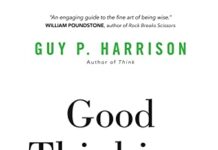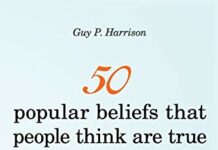
Ebook Info
- Published: 2013
- Number of pages: 354 pages
- Format: PDF
- File Size: 5.57 MB
- Authors: Guy P. Harrison
Description
Written in a respectful and conversational style, this unique book is designed to promote constructive dialogue and foster mutual understanding between Christians and non-Christians. The author, a skeptic and journalist, asks basic questions about Christian belief. What is the born-again experience? Why would God want to sacrifice his only son for the world? Do miracles really happen? How reliable is the Bible? What is the rapture? Why isn’t everyone a Christian? Each question is followed by commentary and analysis that is skeptical and tough but never argumentative or condescending.Christians will find the book useful as a basis for developing their apologetics, while skeptics will welcome Harrison’s probing rational analysis of religious claims.
User’s Reviews
Reviews from Amazon users which were colected at the time this book was published on the website:
⭐I’m an atheist who was looking for a book I could give to my educated Christian relatives that they could read as a primer for a discussion about religion. On page 10 Guy Harrison writes “I wrote this book because I genuinely think it would be better for the world if Christins were to think more deeply about their beliefs while also gaining a better understanding of what is going on in the minds of non-Christians. The best way to achieve this, I believe, is to communicate the reasons for doubt forcefully and respectfully.”Measuring Guy by his own stated standard, I think he completed the task at a minimum level, but could have done far better. For someone looking to provide reading material to Christian friends/family to help them see flaws in their belief system, I now think “Why There is No God” by Armin Navabi combined with “All That’s Wrong with the Bible” by Jonah Connor would probably be better (I have read both, and combined, they have a lower page count than this book).Here is what the book accomplishes well:1. It is polite – this is significant because atheists/skeptics are often condescending in their writing etc which can of course be a turn off if your goal is persuasion.2. It is clearly organized and divided into convenient chapters – you can glance through the 50 questions in the table of contents and find a short chapter talking about any of several critiques of Christianity.Here is where the book is lacking:1. Other than clarity, the book is very poorly organized. Chapters that are similar in content are not grouped together. Furthermore, two of the biggest points that one would want to make to Christians – challenging the Bible as an authoritative source and placing the burden of proof on the person making the religious claim – are not made until chapters 42 and 49 respectively! This is a shockingly poor decision, given that in chapters 1-41 the author frequently asks questions like “Why do Christians believe in heaven?” (in order to question people who claim to have “died” and briefly seen heaven) when for most Christians the answer to “why believe in heaven?” is simply “because the Bible says heaven exists”. The belief in the Bible is foundational, the visions of heaven are secondary. Therefore, the challenge to the Bible should have been in the first 5 chapters at minimum. Likewise, the burden of proof argument is foundational for any skeptic, and should have appeared at minimum in the first 5 chapters if not the introduction.2. The author rarely cites sources and often passes up on the opportunity to give examples. For instance, in talking about miracles he points out that several other religions besides Christianity have miraculous claims that are just as unproven as Christianity. But he just mentions that several other miraculous claims – he doesn’t mention specifically. Ok, thanks Guy, but could you have taken the extra time to write 10-20 lines describing a few of these?My believing family members, like most Christians, are of course skeptical of any arguments that challenge their beliefs. Why leave it to them to do the homework of looking up unproven miracles of other faiths? Instances like this are numerous throughout the book. I was frequently saying to myself “I know what he is saying is true, but why not throw 3-5 sources at the reader across a couple pages to help counter any budding uncertainty?”My best guess is it’s because Guy did not want to do the work of extra research, and preferred to finish the book and move on. Guy hurts his ability to communicate in this, and it’s unfortunate because with a bit more work from the author it is possible to communicate more credibly without making the reader’s task more difficult.3. Furthermore, it often feels that rather than construct an argument carefully, Guy merely questioned the Christian teaching from every angle he could think of in a sitting when he wrote a given chapter. The book is often merely conversational in tone rather than precise, logical, scientific, and authoritative (you can be all these things, and approachable as well, but it does take more work). For instance, he says “people within a religion never agree on anything”. Not very precise nor defensible, when “often religious groups disagree on many of the details” is just as clear but much more defensible as true.4. Honestly, I think the author is stretching to reach 50 questions, it shows, and it really harms the book. The best chapters are quite good, but they are mingled in with the repetitive and otherwise low quality chapters. If I were Harrison’s editor, I would have had him reduce it to 25 or 35 questions; that would have made for a much better book. (during my course of reading, I noted 22/50 chapters that I thought were worthwhile considering repetition and some other factors)To elaborate on the repetitive aspect: Here are 3 chapter titles “Does Christianity make societies better?”, “Why do some Christians do bad things in the sight of Jesus?”, and “Does Christianity make individuals better?”. These 3 chapters are scattered throughout the book, but contain a lot of the same information and repetitive arguments (“look at this data comparing Christian and non-Christian societies” – and then the author discussing that). It’s a waste of the reader’s time. There are a surprising number of repetitive chapters like these.Beyond repetitive chapters, a lot of the content is repeated again and again. Frequently, Guy will answer a question at least in part by pointing out that “Christianity is not the only religion, so because Islam and Hinduism etc exists shouldn’t that give nonChristians/skeptics cause to be uncertain of religion?” He makes this point very clearly in chapter 2, and he should not have repeated it ad nauseum for the rest of the book. There are other points that are also repeated overly much, but I don’t want to write a novel here.5. The book thoughtlessly doesn’t consider how certain points will cause Christians to take the entire book less seriously. Again, I am atheist. I’m not talking about how valid criticisms will be a turn off Christians. Talking about how hell or the death of Jesus have X logical/ethical/metaphysical problem are fine. I’m talking about things like questioning the fourth commandment (“Honor your father and mother”) because of abusive parents. Guy, pointing out that the fourth commandment doesn’t address abusive parents is an argument that insults the intelligence of Christian readers – of course they understand that nuance needs to be added (at least, all the Christians I have ever encountered). There is also a chapter asking if Jesus existed as a historical person. Given he is noted as a person by both a Jewish and a Roman historian, this question resulted my college educated Christian family member taking Guy far less seriously from that chapter on. Guy also cites a Gnostic poem but calls it Christian, which again would be a huge (needless) turn off for a modern Christian. Also, Guy says nonbelievers are in the best position to define “Christian,” which again, seems like a needless argument that will generally turn Christian readers away needlessly.6. The author asks a couple of questions about current political debates (“Is America a Christian Nation?” “Is Christmas under attack?” and a question on intelligent design being taught in schools) that in my opinion are flawed because A. They are unrelated to the main thread of all the other questions that are more about Christianity’s merits as a metaphysical explanation for the world (making the book feel needlessly dated), and B. also flawed because generally educated Christians are going to be the ones picking up a book that challenges their worldview, and they probably don’t need persuasion on these topics anyway.7. Generally, the audience of the book seems to be Christians, but here and there he addresses skeptics instead.
⭐I suspect that many Christians really don’t want their beliefs challenged with common sense but this book very gently and authoritatively answers questions that need to be addressed in a straight forward manner: “Why isn’t everyone a Christian? Is faith a good thing? Are atheists bad people? Why is God so violent? How do we know heaven is real?” and many more. Questions that are fundamental to religious belief are calmly and clearly answered. I’m sure there are Christians who have never questioned their faith and who consider themselves true believers. I believe that all religious beliefs should be challenged to see how they hold up to intellectual scrutiny. If someone’s faith is too weak to stand up to honest questions and reasonable answers…well, it’s not very secure, or honest with itself. Unquestioning faith is a delusion as far as I’m concerned. This book answers each question from a Christian standpoint, as well as how a secular (none-religious) person might explain. Christians, stick up for yourselves if you have been misrepresented by these answers. Do you have the fortitude and integrity to examine fundamental questions about your faith?
⭐I am so thankful that Mr. Harrison wrote this book. I would love to send it to every “Christian” that I know. BUT, I know that it would just (at least in most cases) be dismissed as a work of “The Devil”. Even the temptation to read it could be considered “The Devil” tempting them. I believe that I was born with extra skeptic genes because I always had questions for my Sunday School and Bible Study teachers (varying degrees of Evangelicals) that were of a “heretical” nature (to put it mildly). I was not trying to be argumentative; but many, many biblical things just did not make sense to me. Although my mother taught me to question things, I learned very young that the Bible was a special exception for my questioning nature. I had no one who was “safe” to talk to or to whom I could direct questions. I wish there had been a book of this kind that I could have read as a child or young adult – but back then I might have just dismissed it because I was still to deeply involved with/by the head games of Evangelical Christian teachings! I became a “born again Christian” (an inevitable result, I am sure, or wanting to belong and share experiences with the only social group in my life) but I really had to try very hard to believe that I actually did believe because there were always those questions – those nagging unanswered questions – or at least unanswerable questions – for which the “you have to believe by faith” approach slowly proved to be of absolutely help for me because even praying for that faith was not helpful. I struggled for many years before I finally gave myself permission to not believe and to accept that my questions were reasonable and logical to ask. By then my well-meaning born-again Christian Mother was dead. How I wish I had had the courage to speak up before her untimely death. I had been brow-beaten by her for many years about “never having had a personal relationship with Christ” or else, she said, I could not act (or believe) as I did (what ever that meant – since I did not discuss religion on any level with her as an adult). I always defended myself because, after all, I HAD been “born again” and it surely seemed as though (back then) that I was experiencing something!I still struggle over issues like whether we humans have souls and if there is a continuance of existence for us on any level after our earthly death. Nowadays I do feel pangs about that – and really do wonder “is this all there is?”. I still struggle over “personal experiences” in my own life that caused me to believe in the possibility of ghosts (not recently), and perhaps (a really big perhaps) reincarnation. (I am and always have been skeptical of “psychics”, etc.) AND, I continue to struggle with the issue of whether or not there is/was one single controlling intelligent force that “created” everything. I cannot prove that there is or is not one single force – or maybe a committee (which could go a long way to explain some things), and likewise, I cannot prove or disprove the “Big Bang Theory”. One of my childhood questions was, “If God made everything, who made God?”. In the case of the “Big Bag Theory”, where did all that stuff come from that banged so big. So, I am still assailed by many unanswered and maybe unanswerable questions – or at least theories that I am unable to wrap my finite mind around. But this I DO KNOW – AND KNOW FOR SURE – that I am a much happier person “not knowing” or pretending to “know” any god or his/her relatives or spiritual messenger/s.
⭐This book is introduced as a conversation, between friends, one a Christian, the other, perhaps an atheist, or simply a skeptic. It takes a different approach to books from Richard Dawkins or Sam Harris which depending on the reader, can feel like an all out assault on their religious beliefs. Those books are very necessary for some. However, for those in your life who are open to talking about their beliefs and have an open mind, then this book is perfect. It’s gentle enough not to put off or offend committed Christians, but direct enough that it might make them confront and really try to justify things like why the Christian god answers their prayers but allows millions of children to die each year. If you’ve read any of Mr Harrison’s titles before, then you’ll see that this book needfully retreads some old ground, especially 50 Reasons People Give for Believing in a God. No bad thing at all, as Mr Harrison’s writing style is easy to take in and as always the content is well presented. If you’re a Christian and having doubts about your religion or your place in it, do yourself a favour and pick this book up. It will get you thinking, and if you have an open mind and want to challenge yourself and your faith intellectually and honestly then you may finish the book a different person. Even if you’re an atheist, pick up this book and you’ll learn a different way to approach the believers in your life and show them that there is another way. A definite must-read!
⭐I recommend this book to all alike: whether Christian or agnostic or atheist. Food for thought of the highest calible, with no waffle.
⭐By maintaining a polite and respectful tone throughout the book, Harrison steers clear of coming across as sneering and patronising – not always easy when faced with the claims of Christianity. By showing love he ends up heaping hot coals on the heads of his adversaries. Sounds familiar.This book provides a comprehensive arsenal of polite questions capable of unravelling the arguments of believers.
⭐Not “preachy”. Approaches the subject with care. Perfect gift for any Christian questioning their faith.
⭐A thought-provoking book every Christian should read (and every non-Christian living in a Christian family or country). Nice gift idea at Christmas time…
Keywords
Free Download 50 Simple Questions for Every Christian (50 Series) in PDF format
50 Simple Questions for Every Christian (50 Series) PDF Free Download
Download 50 Simple Questions for Every Christian (50 Series) 2013 PDF Free
50 Simple Questions for Every Christian (50 Series) 2013 PDF Free Download
Download 50 Simple Questions for Every Christian (50 Series) PDF
Free Download Ebook 50 Simple Questions for Every Christian (50 Series)



